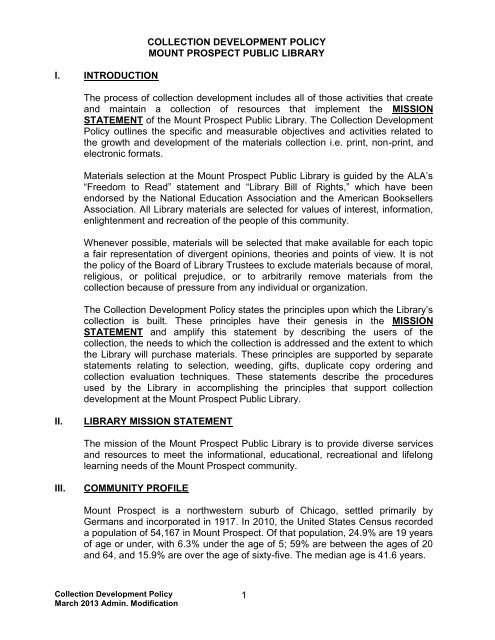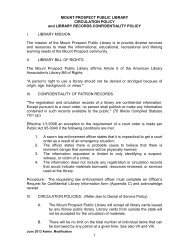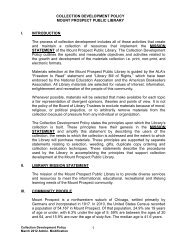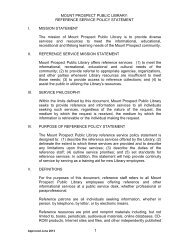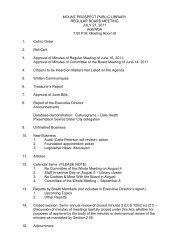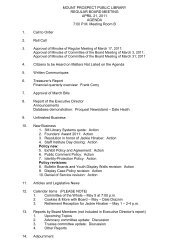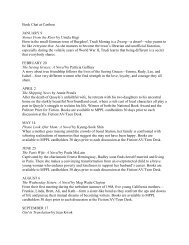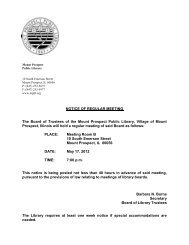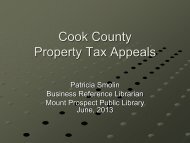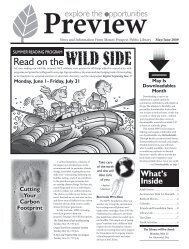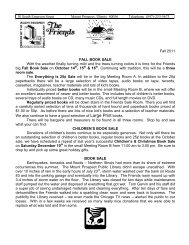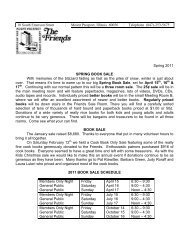collection development policy - Mount Prospect Public Library
collection development policy - Mount Prospect Public Library
collection development policy - Mount Prospect Public Library
You also want an ePaper? Increase the reach of your titles
YUMPU automatically turns print PDFs into web optimized ePapers that Google loves.
COLLECTION DEVELOPMENT POLICYMOUNT PROSPECT PUBLIC LIBRARYCapped Collection: Not growing.Limited Growth Collection: Not targeted for significant growth.Growing Collection: Continually expanding.Developing Collection: New, growing <strong>collection</strong>.B. Criteria for SelectionAuthority of the authorTimeliness and importance for contemporary societyAccuracy, presentation of subject, viewpoint of authorReadability, literary merit, organization of materialReputation of the publisherSuitable physical format – size, paper, print, bindingPriceCommunity needs and demandsRepresentation of various interests and viewpointsRelationship to other material in <strong>collection</strong>Availability in other local librariesPermanent value to the <strong>collection</strong>Reviews in authoritative sourcesSound qualityVisual qualityRequirements for special housing or packagingAppropriateness of the material and/or illustrations for the intendedaudienceElectronic equipment capacityAvailability of technical supportLicensing and networking requirementsEase of UseClarity of PresentationSearch AidsC. TextbooksTextbooks are purchased when no other material in a given field isavailable or to provide a basic understanding of a given discipline. Noattempt is made to supply student demands for textbooks in specificsubjects. Textbooks to support local school curricula are not purchased.Collection Development PolicyMarch 2013 Admin. Modification5
COLLECTION DEVELOPMENT POLICYMOUNT PROSPECT PUBLIC LIBRARYinterest level to serve students and practitioners; this is a limitedgrowth <strong>collection</strong>.2. 100 – Philosophy and PsychologyThe 100s include works on philosophy, psychology and the occultsciences.Philosophy: In the field of philosophy, materials in this limitedgrowth <strong>collection</strong> are collected at the general interest level,including those works representative of the significant, majorphilosophers, classical and modern, as well as popular works in thefield.The occult sciences: The occult sciences include works onastrology, dream interpretation, extraterrestrial visitations, parapsychology,astrology, witchcraft and palmistry. Attempts are madeto satisfy public demands but not at the expense of overall quality.This capped <strong>collection</strong> is developed at the basic level.Psychology: This limited growth <strong>collection</strong> is selected at the basiclevel, including introductory works as well as those in the self-helpor “pop” psychology area. Also included are materials on the widerange of psychological theories and selected critical andexplanatory works on major issues in contemporary psychology.3. 200 – ReligionThe <strong>Mount</strong> <strong>Prospect</strong> <strong>Public</strong> <strong>Library</strong> will endeavor to build a growing<strong>collection</strong> at the basic level in areas including, but not limited to:inspirational, self-help titles; representative works on atheism,agnosticism and various cults. Titles will be collected at the generalinterest level on the history, major works and practices of diverseworld religions, mythologies and representative works of variousreligious texts and commentaries.4. 300 – Social SciencesThe social science <strong>collection</strong> includes materials reflecting currentand historical trends and perspectives. A balance will be providedin each social science, representing as many views as possible.Materials are collected in the following areas on the basic level:company histories, costume, customs, education, folklore,etiquette, public administration, military science, commerce andstatistics. Multiple copies of test preparation guides are maintainedCollection Development PolicyMarch 2013 Admin. Modification8
COLLECTION DEVELOPMENT POLICYMOUNT PROSPECT PUBLIC LIBRARYinterest level is also a growing <strong>collection</strong>. World history andHolocaust materials are also acquired on a general interest level ina limited growth <strong>collection</strong>.GenealogyThe <strong>Library</strong> has a limited growth special <strong>collection</strong> of genealogicalmaterials at the general interest level, which includes Illinois andlocal history materials, U.S. immigration and census records, localdocuments, genealogy periodicals/newsletters and resources forresearching family ancestries.11. BiographyThe biography section includes individual and collectivebiographies, autobiographies, journals, diaries, letters, andmemoirs. This area is maintained at the basic level and has limitedgrowth. Biographies of journalists, performing artists, sports figuresand presidents may be housed in their respective subject areas.12. Reference CollectionThe Reference Collection is a non-circulating <strong>collection</strong> of basic,general interest and specialized materials providing quick access tofactual information on the entire range of human knowledge. Thetools in the <strong>collection</strong> should supply as many reliable facts aspossible with a minimum of duplication and overlap.Reference materials will be chosen or retained according to thefollowing criteria; information is clearly presented and arranged;contains an adequate index or other special locating features;accuracy; authenticity; scope; depth of coverage and ease of use.Reference resources of area libraries will be considered,particularly when the title is expensive or highly specialized.Historical perspective is a consideration. Titles that are not normallyregarded as reference materials may be added to the reference<strong>collection</strong> when they provide information in specific subject areasnot adequately addressed in standard reference sources.The <strong>Mount</strong> <strong>Prospect</strong> <strong>Public</strong> <strong>Library</strong> endeavors to develop abusiness reference <strong>collection</strong> to satisfy the needs of the smallbusiness community, students, job seekers, investors, andconsumers.Collection Development PolicyMarch 2013 Admin. Modification11
COLLECTION DEVELOPMENT POLICYMOUNT PROSPECT PUBLIC LIBRARYGeneral Fiction This growing <strong>collection</strong> includes genres such assuspense, thrillers, romance, fantasy, westerns, classics, literary,horror and foreign translations. Fantasy, holiday, horror, romanceand westerns are labeled with genre stickers.Book Discussion Collection This <strong>collection</strong> of limited growthincludes multiple copies of fiction and nonfiction titles that aresuitable for discussion. In most cases, these titles have beenpreviously used for discussion by one of the <strong>Library</strong>’s bookdiscussion groups. Individual copies of these titles reside in the<strong>Library</strong>’s main <strong>collection</strong>, with multiple copies being housed in thebook discussion <strong>collection</strong>.Book Discussion Kits – Books to Go: for Book Groups Each title inthis <strong>collection</strong> includes a canvas bag filled with a binder thatcontains information about the book, author and questions fordiscussion, as well as 10 softcover or paperback fiction and/ornonfiction titles suitable for discussion. The majority of titles in this<strong>collection</strong> are current, well-reviewed, notable titles that may appealto local private book discussion groups. This is a very limited<strong>collection</strong> purchased through donated funds.Classics/Literary Every attempt is made to maintain copies ofclassics that are in good condition. Copies may be obtainedthrough donation and/or purchase.Foreign Translations Selection is based on the overall criteria offiction selection with consideration given to titles that receivemeritorious reviews or where established authors are popular.Mysteries Titles selected for the mystery <strong>collection</strong> usually involve acrime and/or murder. Every attempt is made to purchase all titles inseries that are popular and/or receive good reviews.Paperback Collection This capped <strong>collection</strong> is mainly for browsing.Acquisition is accomplished mainly through donations,supplemented by purchases.Science Fiction Series, popular authors/titles, and those thatreceive excellent reviews, are selected for this limited growth<strong>collection</strong>.Collection Development PolicyMarch 2013 Admin. Modification13
COLLECTION DEVELOPMENT POLICYMOUNT PROSPECT PUBLIC LIBRARYShort Stories Popular authors/titles and those that receive excellentreviews are selected for this capped <strong>collection</strong>, which is interfiledwith the general <strong>collection</strong>.Westerns Interfiled with the general fiction <strong>collection</strong>, only the mostpopular authors are purchased.Bestsellers Club The Bestsellers Club is comprised ofapproximately seventy-five regular print and twenty-five large printpopular fiction authors whose novels encompass the <strong>Library</strong>’s mostpopular genres. Circulation statistics of previous works determinewhich author is included on the lists. Bestseller Club patrons mayselect an annually designated number of authors from the lists andhave their name automatically placed on the request list when newtitles are published by those authors.14. Large TypeLarge type materials, both fiction and nonfiction, are orderedprimarily through, but are not limited to, standing order plans. Thisis a popular browsing <strong>collection</strong>, and titles are selected accordingly.This <strong>collection</strong> has limited growth, except for the nonfiction andwestern <strong>collection</strong>s which are capped.15. Graphic Novels for AdultsGraphic novels are defined as “book length <strong>collection</strong>s of sequentialart containing a single story, or a set of interrelated stories.” This isa developing <strong>collection</strong> intended primarily for an adult audience.Criteria for selection include reviews, quality of the material,awards, patron demand, popularity of similar material in the<strong>collection</strong> and importance of the work to the history of the medium.16. Young AdultThis basic level <strong>collection</strong> of fiction and nonfiction titles is intendedto meet the needs of young people between the ages of 11 and 18,in grades 6-12. Criteria for selection are the same as those criteriafor the adult <strong>collection</strong> as listed in Sections VI. B and VII. Thenonfiction <strong>collection</strong>, which is interfiled with the adult <strong>collection</strong>,includes the following topics: teen issues, careers, pop culture,history, music, sports and popular biographies. Materials in alldisciplines, as well as multiple copies of classics and schoolreading list titles, are purchased to enhance school assignments.The <strong>collection</strong> includes materials with a broad range of reading,Collection Development PolicyMarch 2013 Admin. Modification14
COLLECTION DEVELOPMENT POLICYMOUNT PROSPECT PUBLIC LIBRARYcomprehension and maturity levels, presentation of subjects,diversity of appeal and points of view; therefore, selection may notbe age appropriate for every person in the targeted age range, 11-18.Young Adult Graphic NovelsThe developing Young Adult Graphic Novels <strong>collection</strong> iscomprised of age appropriate popular, recreational materialtargeting students in grades 6-12. Graphic novels are defined as“book length <strong>collection</strong>s of sequential art containing a single story,or a set of interrelated stories.” (YALSA) Criteria for selectioninclude reviews, quality, awards, patron demand, popularity ofsimilar materials, importance of the work to the history of themedium, age of the main characters and/or themes and subjects ofparticular interest to Young Adults.Teen Book Discussion KitsTeen book discussion kits are checked out to teachers or librariansat <strong>Mount</strong> <strong>Prospect</strong> schools who are interested in using the kits forbook discussions with students. Each kit features at least tencopies of a title appropriate for teens in grades 6-12, a binder thatcontains information about the book and the author, possiblediscussion questions, ideas for related classroom activities andlesson plans, and readalike lists. Titles are selected based on theirappeal to teens and the books’ ability to be discussed. Additionaltitles may be added when multiple copies are purchased for teenbook discussions, Suburban Mosaic and/or Book Crossingdiscussions, or Rebecca Caudill awards.17. Sheet Music CollectionMaterials will be collected for the Blaine Music Collection throughdonations from the public. The <strong>collection</strong>, which started with adonation from the estate of Edith and William T. Blaine, Sr.,consists of sheet music and <strong>collection</strong>s representing a variety ofstyles, performance levels and interests. This capped <strong>collection</strong>houses mainly piano and vocal music, but may contain otherinstrumental sheet music as well.18. Adult New Reader, English Language Learning, and English as aSecond Language MaterialsCollection Development PolicyMarch 2013 Admin. Modification15
COLLECTION DEVELOPMENT POLICYMOUNT PROSPECT PUBLIC LIBRARYThe <strong>Library</strong> maintains a special <strong>collection</strong> of print and non-printmaterials at the basic level for adult new readers and readers ofEnglish as a second language. Adult educational materials,including print and AV materials for those learning English, and“teach yourself” texts on English grammar, usage and readinginstruction are emphasized.19. Government Document Collection (see Appendix A)A federal depository <strong>collection</strong> has been housed in Adult Servicessince 1977.Approximately 16% of the available documents are selected for the<strong>collection</strong>.Documents are in paper, microform and electronic formats.The <strong>collection</strong> will follow maintenance guidelines in accordancewith the Instructions for Depository Libraries.Commercial reference resources are purchased to complement thedocuments <strong>collection</strong>.20. Administration CollectionB. PERIODICALSThis <strong>collection</strong>, which is housed in Administration, is comprised ofprint and audiovisual materials in a variety of subjects to aid librarystaff in the <strong>development</strong> of library services, management andpractices. Materials are available to the general public uponrequest.Periodical titles in business, finance, health, science, current events,hobbies and other topics are selected at the general interest level toprovide for the informational and recreational needs of patrons in printand/or non-print formats. An array of subjects and viewpoints arerepresented. Professional journals in library science are provided forlibrary staff and patrons.Criteria in selection of periodicals include reputation of the publisher,quality of the writing, patron interest, cost and relationship to the <strong>Library</strong>’ssubject strengths. The availability of content through indexing is also aconsideration.Collection Development PolicyMarch 2013 Admin. Modification16
COLLECTION DEVELOPMENT POLICYMOUNT PROSPECT PUBLIC LIBRARYLocal and major Chicago newspapers and significant national andfinancial papers are included in the periodical <strong>collection</strong>. Out-of-townnewspapers may be located through websites.C. MICROFORMSThe <strong>Library</strong> maintains a microform <strong>collection</strong> consisting of census recordsand back files of select magazines, journals and newspapers, as well assome business, historical, genealogical and government publications.D. WORLD LANGUAGE COLLECTIONFiction and nonfiction print and AV materials in world languages arepurchased at the basic introductory level, including but not limited to,Chinese, Gujarati, Hindi, Japanese, Korean, Polish, Russian, Spanish,Urdu, and Vietnamese Small <strong>collection</strong>s in German, French and Italian areretained, but not developed, for curriculum support.E. AUDIOVISUAL COLLECTION (AV)The audiovisual <strong>collection</strong> consists of books on digital audio,audiocassette and compact disc, VHS, DVD, framed photography andoriginal art. Selection criteria for the audiovisual <strong>collection</strong> are included inSection VI. B.1. Music2. VideoPopular and classical music is purchased on compact disc.Selection is based on reviews in authoritative sources online and inprint, sales popularity and local patron demand. The popular music<strong>collection</strong> reflects a broad diversity of styles and genres, includingpopular and critically/historically important artists. The classicalmusic <strong>collection</strong> offers representative recordings of the works ofnotable composers of all eras. Special effort is made to acquirerecordings of operas featured at the Lyric Opera of Chicago.The video <strong>collection</strong> includes fiction and nonfiction titles in VHS andDVD formats. Criteria for selection include, but are not limited to,reviews, box office popularity, cultural and historical significance,various points of view, diversity and community demand. Fictionand nonfiction DVD is a growing <strong>collection</strong> at the general interestlevel. DVD is the primary format; multiple copies are purchased asneeded. VHS titles are no longer acquired or replaced.Collection Development PolicyMarch 2013 Admin. Modification17
COLLECTION DEVELOPMENT POLICYMOUNT PROSPECT PUBLIC LIBRARY3. Framed artFramed art and framed photography are selected on the basis ofartistic merit in style, medium or content. Original works by localand regional artists/photographers are emphasized. This is acapped <strong>collection</strong>.4. Audio booksThe adult and young adult audio book <strong>collection</strong> is comprised ofboth fiction and nonfiction books in audiocassette and compact discformats. Selection is based on popular demand, quality reviews,awards, and narration. This is a limited growth <strong>collection</strong>.Audiocassettes are no longer acquired or replaced.Included in this section are Playaways, a developing digital book<strong>collection</strong>, also comprised of fiction and nonfiction books, as well asclassics.5. The De Filipps CollectionThe Great Courses is a developing <strong>collection</strong> of advanced levelmaterials on a variety of subjects on compact disc and DVD. Thebulk of this <strong>collection</strong> was purchased with a donation from Gail andWillard De Filipps and will be maintained and expanded when newmaterial is published.F. ELECTRONIC COLLECTIONElectronic materials include, but are not limited to, CD-ROM and OnlineResources. Criteria for selection of Online Resources include the samecriteria for the adult <strong>collection</strong> as listed in section VI. B with the addition ofthe following: 1) availability of remote access, 2) number of simultaneoususers allowed, 3) frequency of updates, and 4) availability of usagestatistics.1. Online sourcesCommercial and non-commercial databases will be selected tocomplement and supplement the print, audiovisual and otherelectronic <strong>collection</strong>s.Collection Development PolicyMarch 2013 Admin. Modification18
COLLECTION DEVELOPMENT POLICYMOUNT PROSPECT PUBLIC LIBRARY2. CD-ROM productsa. In-house CD-ROM products are not acquired.b. Circulating3. Video GamesA small, decreasing <strong>collection</strong> of informational CD-ROMproducts is maintained. Subject areas include, but are notlimited to, language instruction, keyboarding, testpreparation and educational games.The video game <strong>collection</strong>s are limited, general level, developing<strong>collection</strong>s offering a variety of gaming genres. Considerations forselection include, but are not limited to, the following: reviews fromreputable gaming sources, patron demand, general popularity,rating guides and media crossover.a. The young adult <strong>collection</strong> is intended primarily for students ingrades 6-12. The young adult <strong>collection</strong> is shelved separately.b. The adult <strong>collection</strong> is intended primarily for adult patrons and isshelved separately.4. E-booksa. The <strong>Library</strong> currently participates in a consortium whichmanages the MyMediaMall <strong>collection</strong> of electronic books. Theconsortium provides subscription access to electronic media intwo types of formats: audio and e-books. Titles and the numberof licenses are determined by a <strong>collection</strong> committee comprisedof several members from MyMediaMall participating libraries,although the <strong>Library</strong> may purchase additional licenses for MPPLpatrons. Fiction and nonfiction adult, young adult and youthtitles are selected based upon their availability, popularity,lasting value and format. This is a growing <strong>collection</strong> that iscurrently at the basic level.b. The <strong>Library</strong> currently purchases basic, general interest andspecialized reference and research titles through Gale VirtualReference <strong>Library</strong> (GVRL). Titles are selected to complement,supplement or replace the print, audiovisual and other electronic<strong>collection</strong>s.Collection Development PolicyMarch 2013 Admin. Modification19
COLLECTION DEVELOPMENT POLICYMOUNT PROSPECT PUBLIC LIBRARYVIII.YOUTH SERVICES COLLECTIONThe Youth Services <strong>collection</strong> is intended to meet the needs of children from birththrough age 11 or sixth grade as well as parents, teachers and other caregivers.It is intended to generally enhance local schools’ curricula. A wide variety ofmaterials is purchased in order to satisfy a range of interests and <strong>development</strong>al,educational and maturity levels. The General Materials Selection Guidelines, VIabove, apply to Youth materials.A. Specific Youth Services Selection Area Guidelines for Print MaterialsAll Youth print selection areas are limited growth, general interest<strong>collection</strong>s, except as noted below.1. J 000 – GeneralitiesThe J 000s includes general knowledge, communication, computerscience, and journalism. Circulating copies of general knowledgereference materials such as general encyclopedias or specificalmanacs are included in this <strong>collection</strong>.2. J 100 – Philosophy and PsychologyThis <strong>collection</strong> contains materials on psychology, parapsychologyand occultism that are deemed appropriate for children. Asignificant portion of the <strong>collection</strong> includes materials that explainand interpret emotions and interpersonal relationships.3. J 200 – Religion and MythologyIn order to provide a broad coverage of religion, this <strong>collection</strong>contains materials that provide historical and current perspectiveson world religions, versions of religious texts and works on worldmythologies.4. J 300 – Social SciencesThe J 300s includes materials in the areas of social sciences,political science/government, social issues/problems,economics/money, law, education, commerce/trade customs,costumes and dress, etiquette, folklore and world holidays. This<strong>collection</strong> includes an extensive and authoritative multiculturalselection of folk tales, fairy tales and nursery rhymes.Collection Development PolicyMarch 2013 Admin. Modification20
COLLECTION DEVELOPMENT POLICYMOUNT PROSPECT PUBLIC LIBRARY5. J 400 – LanguageThe J 400s includes phonics, grammar, use of the Englishlanguage, sign language and study of world languages. Junior andstandard English dictionaries and thesauri are purchased as well asdictionaries in other world languages. A <strong>collection</strong> of materials forchildren learning a language other than English is maintained.6. J 500 – Pure SciencesThe pure sciences section includes material on mathematics,astronomy, physics, chemistry, earth sciences, paleontology, lifesciences, botany and zoology. Science experiment information thatsupports science fair projects is emphasized.7. J 600 – Applied SciencesThe applied sciences <strong>collection</strong> includes materials in the subjectareas of medical science, engineering, agriculture, homeeconomics, business, chemical technology, manufacturing,building, communication, transportation, robotic and electronictechnology. A wide range of materials is collected on humanphysiology, including sex education, sexuality, growth, diseases,health education and drug abuse. In the cookery and nutritionsection of the <strong>collection</strong> special attention is given to recipes andfoods of other countries and world cultures. Farming, gardening,and simple building/carpentry projects are included. A wide rangeof materials on pets, pet care and areas of transportationtechnology is included.8. J 700 – The ArtsThis <strong>collection</strong> includes how-to-draw materials, cartooningtechniques, comic/cartoon books, art history, art appreciation, theperforming arts and biographies of well-known artists. The <strong>Library</strong>also provides information about computer and electronic games,indoor/outdoor games, party ideas, magic tricks and riddles.Handicraft and “how-to” materials emphasize inexpensive projectsfor children to make with little or no supervision, as well as craftbooks with holiday and cultural themes. A popular music <strong>collection</strong>is maintained including American music, international folk songs,music history and biographies. A <strong>collection</strong> of materials about awide range of sports, including popular sports personalities isincluded.Collection Development PolicyMarch 2013 Admin. Modification21
COLLECTION DEVELOPMENT POLICYMOUNT PROSPECT PUBLIC LIBRARY9. J 800 – LiteratureThis <strong>collection</strong> includes poetry with appeal for children, materials ondrama and play scripts, materials on the writing process, includingreports, term papers and creative writing, and jokes.10. J 900 – Geography and HistoryThe J 900s includes the subjects of geography, travel, Americanhistory and world history. This <strong>collection</strong> includes all periods ofAmerican history, Native American history and basic world history.Individual materials on the states of the United States and countriesof the world are collected. Collected biographies of persons inhistory are included in this area.11. J BiographiesThis section includes individual biographies of historical, famous,popular or otherwise significant individuals at various reading andinterest levels. (Collected biographies and some individualbiographies, including saints, scientists, inventors, entertainers andsports figures, are included in their respective subject areas.)12. J ER (Early Reader) NonfictionThis <strong>collection</strong> consists of items that are written with controlledvocabulary for emergent readers through a second grade readinglevel. They are selected along the above stated guidelines fornonfiction selection areas.13. J Graphic NonfictionNonfiction materials written in the graphic literature format forchildren are included in many nonfiction areas, including but notlimited to folklore, sciences, history, and biography.14. J Fictiona. J E Picture BooksThis <strong>collection</strong> includes books in which at least fifty percentof the story is told through pictures. These books areespecially appealing to preschool children and are primarilyused as read-alouds. Multiple copies of some titles may beCollection Development PolicyMarch 2013 Admin. Modification22
COLLECTION DEVELOPMENT POLICYMOUNT PROSPECT PUBLIC LIBRARYpurchased based on popular demand, awards received,critical acclaim or use in library programming.b. J E Board BooksDesigned for use primarily by infants and toddlers, thesebooks are made of sturdy cardboard, have bold and colorfulart work and rhyming text or very few words.c. J ER (Early Reader) FictionThis <strong>collection</strong> includes books with controlled vocabulariessuitable for the emergent reader through a second gradereading level. Multiple copies of these titles are purchasedbased on popular demand, awards received, or criticalacclaim. Basic readers with a textbook format are notpurchased.d. J FictionThis <strong>collection</strong> provides novels for children from third throughsixth grades, with occasional inclusion of young adult titleswhen they have appeal and are also appropriate for youngerchildren. A variety of fiction genres is collected, includinghistorical fiction, science fiction, realistic fiction, humor,adventure, mystery and fantasy. The <strong>collection</strong> includespopular fiction as well as classics and other titles, authorsand stories of enduring value. Multiple copies may bepurchased based on popular demand, awards received,critical acclaim or use in library programming. Multiple copiesof a title may also be added to the paperback <strong>collection</strong>.Popular titles, award winners, or titles that have won criticalacclaim may be purchased in a large print format asavailable.e. J Fiction Picture Books for Older ReadersThis <strong>collection</strong> includes books in which at least fifty percentof the story is told through pictures. These books havethemes that are more suitable and more appealing to olderreaders.Collection Development PolicyMarch 2013 Admin. Modification23
COLLECTION DEVELOPMENT POLICYMOUNT PROSPECT PUBLIC LIBRARYf. J PaperbacksThis <strong>collection</strong> includes classics, popular fiction series formatbooks and media tie-ins. Many of the titles in this <strong>collection</strong>are duplicates of popular hardcover titles and supplementthe juvenile fiction <strong>collection</strong>. Multiple copies may bepurchased based on popular demand, critical acclaim orlibrary programming.g. J BrailleThis capped <strong>collection</strong> is maintained at the basic level andrelies on donations.h. J Graphic NovelsThis <strong>collection</strong> contains books that tell one or a number ofstories in cartoon or sequential art format and that appealprimarily to the elementary school reader. Titles arepurchased in hardcover, when available; otherwise,paperbacks may be purchased.i. Kids Books-to-GoEach title in this <strong>collection</strong> includes fifteen to twentypaperback copies and a binder that contains informationabout the book, the author and discussion questions. Allmaterials for each title are circulated together in a canvasbag. Titles are suitable for group discussion among children,or among children with parents and other caregivers.15. J World Language CollectionMaterials in world languages other than English are purchased,including but not limited to Spanish, Polish, Russian, Korean,Japanese and French at the basic level, to include picture book,board book, fiction and/or non-fiction titles. Materials in other worldlanguages are collected to reflect the needs of the community.16. J Parent/Teacher CollectionThis <strong>collection</strong> provides parents, teachers and other caregivers withmaterials about child <strong>development</strong>, health and wellness of children,parenting skills, special needs, family issues, child care, literacy, aswell as preschool, school and curriculum issues. The <strong>collection</strong> alsoCollection Development PolicyMarch 2013 Admin. Modification24
COLLECTION DEVELOPMENT POLICYMOUNT PROSPECT PUBLIC LIBRARYincludes materials about school projects, library skills, crafts,games, learning activities and workbooks.17. J Spanish Language Parent/Teacher CollectionThis <strong>collection</strong> provides parents, teachers and other caregivers withSpanish language materials about child <strong>development</strong>, health andwellness of children, parenting skills, special needs, family issues,child care, literacy, as well as preschool, school and curriculumissues.18. J Children’s Professional CollectionThis is a non-circulating <strong>collection</strong> which is developed to assistlibrary staff with the <strong>development</strong>, administration and evaluation ofchildren’s library services, and with the planning and execution ofstorytimes and other programs for children, families and caregivers.Resources for program planning, children’s literature, selectedrhyme, poetry and literature anthologies, handicraft materials, asmall <strong>collection</strong> of picture books and out-of-print titles are included.This <strong>collection</strong> also includes toys, audiovisual materials and someSpanish language materials for program planning.19. J Outreach Holiday CollectionThis <strong>collection</strong> consists of additional copies of popular picturebooks with holiday themes. Circulation is limited to child carecenters, preschools, home day care providers and other selectedoutreach venues.20. J Reference CollectionThe Reference Collection is a non-circulating <strong>collection</strong> of generaland specialized materials providing access to factual information onthe entire range of human knowledge. The tools in the <strong>collection</strong>should supply as many reliable facts as possible with a minimum ofduplication and overlap.The Reference Collection includes, but is not limited to, thefollowing types of materials:a. General dictionaries and encyclopedias, including generalencyclopedias in Spanishb. Selected subject area encyclopedias and dictionaries, asneededCollection Development PolicyMarch 2013 Admin. Modification25
COLLECTION DEVELOPMENT POLICYMOUNT PROSPECT PUBLIC LIBRARYc. Handbooks, and statistical compendia and guidesd. General atlasese. Indexesf. Bibliographiesg. Biographical dictionaries of world, national, regional,professional or occupational persons of note, withretrospective and current coverage21. J Periodicalsa. J Children’s PeriodicalsPeriodicals of general interest to children birth through age11 or sixth grade are maintained.b. J Parent/Teacher Periodicals22. In-House ComicsPeriodicals on parenting, child <strong>development</strong>, childpsychology and preschool/elementary school curriculum areincluded in this <strong>collection</strong> to supplement the otherparent/teacher materials.A <strong>collection</strong> of noncirculating comics appropriate for childrenthrough age 11 or grade 6 is purchased through local sources.B. Specific Youth Services Selection Guidelines for Audiovisual MaterialsThe Youth audiovisual <strong>collection</strong> consists of <strong>development</strong>al toys, compactdiscs, audiocassettes, video (including DVD, Blu-ray, and VHS), twoformatkits, multi-format kit-bags, “Playaways,” and “Playaway Views.”Some world language materials are included in some of the audiovisualformats. All Youth audiovisual selection areas are limited growth, generallevel <strong>collection</strong>s, except as noted.1. Developmental ToysThese in-house and circulating <strong>collection</strong>s consist of durable toys,games, puzzles and puppets that assist in the <strong>development</strong> ofmanipulative, cognitive, imaginative and infant play. Emphasis isplaced on procuring educational materials that are not readilyavailable to the public for purchase. Most items in the circulating<strong>collection</strong> are limited to 12 pieces.Collection Development PolicyMarch 2013 Admin. Modification26
COLLECTION DEVELOPMENT POLICYMOUNT PROSPECT PUBLIC LIBRARY2. Compact Discs and Audiocassettes3. VideoCompact discs that are of educational, informational or recreationalvalue for children, parents and other caregivers are collected.Unabridged books and a wide variety of music and spoken wordare purchased. Special efforts are made to purchase materials thatare popular or that receive critical acclaim. As an older format,audiocassettes, including audio books, music and spoken word, areno longer purchased.This <strong>collection</strong> includes children’s fiction and nonfiction titles thatare of entertainment and educational value, as well as titles forparents and other caregivers on child-centered issues. A specialeffort is made to purchase video adaptations of Newbery andCaldecott Award and Honor books as available. The video<strong>collection</strong> in DVD and Blu-ray formats is growing and duplicatecopies may be purchased, based on popular demand. The video<strong>collection</strong> also includes VHS format although there are no newpurchases in this older format.4. Two-format KitsThese kits contain two formats of the same title, e.g., a book and aread-along compact disc. Two-format kits that include the olderaudiocassette format are included in this <strong>collection</strong>, but are nolonger purchased. Early Reader, picture book and world languagematerial make up most of this <strong>collection</strong>, and folktales are also wellrepresented.5. Multi-format Kit-BagsKit-Bags, limited in number in each category, include a variety ofpaperback, hardcover, board books, toys, audio books, music orvideo in a carrying bag.a. Travel KitsThese kits are designed to entertain preschool throughelementary school age children while they are traveling withtheir families. All kits include a variety of books, audio books,music, games or toys, plus a travel guide.Collection Development PolicyMarch 2013 Admin. Modification27
COLLECTION DEVELOPMENT POLICYMOUNT PROSPECT PUBLIC LIBRARYb. Get Well KitsThese kits are designed to entertain preschool or elementaryschool age children while they are recuperating from illness.The kits include a variety of books, games, toys, audiobooks, music and an activity book.c. Toddler BagsThese bags include a variety of books, toys and music,specifically selected for toddlers.d. Activity BagsActivity bags are designed for use by preschool children andtheir teachers and parents. They include a variety of<strong>development</strong>ally appropriate themes. Each bag containsseveral books and a minimum of one toy, game, puzzle orpuppet.e. Early Literacy BagsEarly literacy bags are designed for parents to use with theirpreschool age children to work on early literacy skills. Eachbag contains several books and a minimum of one toy,game, puzzle or puppet.f. Parent Concern KitsParent concern kits are designed to aid parents and theirchildren in exploring and dealing with some common parentchildthemes such as death, divorce and toilet training. Eachbag includes print materials for parents and children, as wellas related audiovisual materials (music, video or toy).g. Science-to-Go KitsThese kits are designed to promote science and makescience equipment accessible to parents, teachers, andchildren. Each kit contains science equipment and a bindercontaining information on how to use the kit. Other items, i.e.teacher’s guide, may be included.Collection Development PolicyMarch 2013 Admin. Modification28
COLLECTION DEVELOPMENT POLICYMOUNT PROSPECT PUBLIC LIBRARY6. “Playaways”This developing book <strong>collection</strong> of pre-loaded digital audiobooksincludes popular and classic fiction titles that appeal primarily to theelementary school age reader. Some nonfiction, includingbiographies, is also included.7. “Playaway Views”This is a developing <strong>collection</strong> of portable video players that arepre-loaded with multiple videos. The <strong>collection</strong> includes populartelevision shows and movies for children, as well as some picturebook and nonfiction titles for children.C. Specific Youth Services Selection Guidelines for Electronic MaterialsThe Youth electronic <strong>collection</strong> includes, but is not limited to, software,CD-ROM products, video games, and on-line resources appropriate tochildren. Criteria for selection include those listed in VI. B. above, plus: 1)availability of remote access, 2) number of simultaneous users allowed, 3)frequency of updates, and 4) availability of usage statistics.1. Electronic Educational Games (Leapster)This capped <strong>collection</strong> includes a limited number of non-circulatingelectronic educational games for preschool through fourth gradestudents.2. CD-ROM productsCD-ROM products are provided in a circulating <strong>collection</strong> to meeteducational, informational, and recreational needs of children.3. Video GamesThe video game <strong>collection</strong> is a limited, basic level, and developing<strong>collection</strong> intended primarily for children from preschool throughsixth grade. Considerations for selection include, but are not limitedto, the following: reviews from reputable gaming sources, patrondemand, general popularity, ratings guides and media crossover.4. E-booksa. The <strong>Library</strong> currently participates in a consortium whichmanages the MyMediaMall <strong>collection</strong> of electronic books. TheCollection Development PolicyMarch 2013 Admin. Modification29
COLLECTION DEVELOPMENT POLICYMOUNT PROSPECT PUBLIC LIBRARYconsortium provides subscription access to electronic media intwo types of formats: audio and text e-books. Titles and thenumber of licenses are determined by a <strong>collection</strong> committeecomprised of several members from MyMediaMall participatinglibraries, although the <strong>Library</strong> may purchase additional licensesfor MPPL patrons. Youth titles are selected based upon theiravailability, popularity, lasting value and format. This is agrowing <strong>collection</strong> that is currently at the basic level.b. The <strong>Library</strong> currently purchases basic, general interest andspecialized reference and research titles for youth through GaleVirtual Reference <strong>Library</strong> (GVRL). Titles are selected tocomplement, supplement or replace the print, audiovisual andother electronic <strong>collection</strong>s.5. Online SourcesCommercial and noncommercial databases are selected tocomplement and supplement the print, audiovisual and otherelectronic <strong>collection</strong>s.IX.SOUTH BRANCH COLLECTIONThe South Branch <strong>collection</strong> meets the needs of <strong>Mount</strong> <strong>Prospect</strong>’s community, inaccordance with the <strong>Library</strong>’s Mission Statement, with a focus on the particularneeds of the population served by the Community Connections Center in whichthe South Branch is housed.<strong>Mount</strong> <strong>Prospect</strong>’s community includes 15,159 foreign-born residents,approximately 27% of the total population. Further, according to theNeighborhood Resource Center Needs Assessment 2007 by MillenniaConsulting, 42% of the population is bilingual, 10% do not speak English well orat all and are a diverse population with largest groups from Mexico, Poland andIndia. The far south section of <strong>Mount</strong> <strong>Prospect</strong>, where this branch is located, isnoted in the Assessment as one in which immigrant, minority and low-incomeresidents are concentrated. Additionally, District 59 elementary schools andjunior high school located in <strong>Mount</strong> <strong>Prospect</strong> report that 38.45% of students livein homes where Spanish is spoken, a percentage which is up to 69.2% in onelocal elementary school.The South Branch <strong>collection</strong> is developed in accordance with the <strong>Library</strong>’sCollection Development Policy. It is a Developing Collection at the Basic Level(see section VI. of the Collection Development Policy, General Material SelectionGuidelines).Collection Development PolicyMarch 2013 Admin. Modification30
COLLECTION DEVELOPMENT POLICYMOUNT PROSPECT PUBLIC LIBRARYThe <strong>collection</strong> consists of print and non-print resources in English and worldlanguages. World language materials are predominantly in Spanish, with aGujarati <strong>collection</strong>. Materials in other world languages may be collected, as well,to reflect additional needs of the community.A. South Branch Selection Area Guidelines for Adult/Teen Print Materials1. NonfictionThe nonfiction <strong>collection</strong> consists of materials across subject areas.These materials reflect the needs of the community and focus onpopular works and works with practical application. Teens andstudents are considered in the selection of materials in this<strong>collection</strong>. Topics focus on, but are not limited to the following:000 - Popular works; how-to computer titles100 - Popular inspirational; self-help titles200 - Basic religion300 - Relevant, current issues as they pertain to the community;citizenship and immigration guides and information; legalhow-to titles400 - Literacy, ESL, and basic language instruction500 - Practical works on math and science as appropriate tocommunity needs600 - Car repair; home repair; cookbooks; health; small business;entrepreneurship; jobs and careers700 - Popular sports; sports figures; crafts800 - Bilingual poetry and a highly selective <strong>collection</strong> of otherliterature titles900 - Basic history and geography and works as they pertain tothe interest and needs of the communityBiography - Popular biographies2. FictionThe fiction <strong>collection</strong> is comprised of popular and recent titles inEnglish and in world languages.3. ESL/ABEThe South Branch maintains a <strong>collection</strong> of print and non-printmaterials for adult new readers and for learners of English as asecond language. Adult educational materials, including print andAV materials for those learning English, and self-instruction texts onCollection Development PolicyMarch 2013 Admin. Modification31
COLLECTION DEVELOPMENT POLICYMOUNT PROSPECT PUBLIC LIBRARYEnglish grammar, usage, reading instruction, test preparation andjob related literacy are emphasized.4. PeriodicalsA small, highly selective <strong>collection</strong> of general interest newspapersand circulating magazines in world languages and English ismaintained.5. ReferenceA small, highly selective <strong>collection</strong> of core materials, such asdictionaries, encyclopedias, almanacs and atlases, for adults andyouth in the world languages and English is maintained.6. Young AdultThe Young Adult <strong>collection</strong> is comprised of popular and recent titlesin English and Spanish intended to meet the needs of young peoplebetween the ages of 11 and 18, in grades 6-12. Titles that supportthe curriculum of local schools and graphic novels may be added.B. South Branch Selection Area Guidelines for Adult/Teen AudiovisualMaterials1. VideoThe fiction video <strong>collection</strong> consists of popular, new and recenttitles in DVD format. Titles in world languages and titles in Englishwith captioning or dubbing in world languages may be provided.The nonfiction video <strong>collection</strong> consists of popular documentariesand how-to titles that reflect the subjects in the print <strong>collection</strong> inDVD format. Teens and students are considered in selection. Titlesin world languages and titles in English with captioning or dubbingin world languages may be provided.2. AudiobooksA small, highly selective <strong>collection</strong> of books on compact disc inSpanish, English, and other world languages will be maintained tomeet the needs of the community.Collection Development PolicyMarch 2013 Admin. Modification32
3. MusicCOLLECTION DEVELOPMENT POLICYMOUNT PROSPECT PUBLIC LIBRARYPopular music on compact disc is selected to reflect the interestsand needs of the community.4. Video GamesA small, highly selective <strong>collection</strong> of video games, intendedprimarily for students in grades 6-12, offering a variety of gaminggenres may be maintained. Considerations for selection include,but are not limited to, the following: reviews from reputable gamingsources, patron demand, general popularity, ratings guides andmedia crossover.C. South Branch Selection Area Guidelines for Youth Print MaterialsThe Youth Services <strong>collection</strong> is intended to meet the needs of childrenfrom birth through age 11 or sixth grade, as well as parents, teachers andother caregivers. Some print <strong>collection</strong>s are in the world languages. Printmaterials are primarily collected in paperback.1. NonfictionYouth nonfiction includes popular and recent materials to reflect theinformational needs and general interest of children, including butnot limited to:000 - Popular works200 - World religions and religious stories; myths300 - Communities; government; folklore; holidays400 - Dictionaries; basic language instruction500 - Physical and biological sciences600 - Pets; human <strong>development</strong>700 - Crafts; sports; recreation800 - Poetry900 - World geography and history, with emphasis on the UnitedStates and cultures represented by population of the community.Biographies – Popular biographies2. FictionYouth fiction includes popular works to reflect the needs andinterests of the community, including board books, picture books,early readers, juvenile fiction, juvenile fiction series, and graphicnovels.Collection Development PolicyMarch 2013 Admin. Modification33
Reference:COLLECTION DEVELOPMENT POLICYMOUNT PROSPECT PUBLIC LIBRARY3. Parent-TeacherThe Parent-Teacher <strong>collection</strong> provides parents, teachers and othercaregivers with materials about child <strong>development</strong>, parenting skills,and learning activities.D. South Branch Selection Area Guidelines for Youth Audiovisual MaterialsThe Youth audiovisual <strong>collection</strong> consists of toys, compact discs, videogames and DVDs. Some compact discs and DVDs are in worldlanguages.1. Toys2. MusicThis <strong>collection</strong> includes a small circulating <strong>collection</strong> of puppets anda small <strong>collection</strong> of toys for in-house use.Popular music and stories on compact disc are selected to reflectthe interest and needs of the community.3. Video Games4. VideoA small, highly selective <strong>collection</strong> of video games, intendedprimarily for children from preschool through sixth grade may bemaintained. Considerations for selection include, but are not limitedto, the following: reviews from reputable gaming sources, patrondemand, general popularity, ratings guides and media crossover.The video <strong>collection</strong> consists of popular feature films in DVDformat. Titles in world languages and titles in English withcaptioning or dubbing in world languages may be provided.APPENDIX A – Government Documents Collection Development Policy; 03/2013<strong>Library</strong> Bill of RightsFreedom to Read StatementCollection Development PolicyMarch 2013 Admin. Modification34
APPENDIX AIntroductionCOLLECTION DEVELOPMENT POLICYMOUNT PROSPECT PUBLIC LIBRARYCollection Development PolicyGovernment DocumentsPage 1 of 3The <strong>Mount</strong> <strong>Prospect</strong> <strong>Public</strong> <strong>Library</strong> was designated a Federal depository library in 1990,assuming the depository status and some depository materials from the NorthwestMunicipal conference (which had held the status since 1977), when it moved from theMPPL location to Oakton Community College. The depository is located in the 9 thCongressional District. Other depositories in the area include Oakton CommunityCollege, Northwestern University, Poplar Creek <strong>Public</strong> <strong>Library</strong>, and Lake ForestCollege. In 2010, the population of <strong>Mount</strong> <strong>Prospect</strong> was 54,167 (77% white, 2.4% black,11.7% Asian and 15.5% are of Hispanic origin); median household income was$67,823; and median age was 41.6. Located 22 miles northwest from downtownChicago, <strong>Mount</strong> <strong>Prospect</strong> is a fairly typical middle class suburb. Additionally, <strong>Mount</strong><strong>Prospect</strong> is home to approximately 2,000 businesses and a major industrial park. Mostof the materials selected are geared toward accommodating the governmentinformation needs of the average adult tax-payer, high school and community collegestudents and the business community.Selection areasThe depository selects heavily in the following areas:Legislative and regulatory materialsDemographicsEconomic informationHealth statisticsTax informationSelection is moderate for these subjects:EducationConsumer informationCrime and JusticeSelection is lighter in the following areas:AgricultureDefenseEnergyForeign affairsCollection Development PolicyMarch 2013 Admin. Modification35
COLLECTION DEVELOPMENT POLICYMOUNT PROSPECT PUBLIC LIBRARYAPPENDIX AResponsibility for selectionCollection Development PolicyGovernment DocumentsPage 2 of 3The Government Documents Librarian is responsible for selection, with the input of theReference Services and Collection Management staff.Selection toolsSelection tools include: the List of Classes, Item Lister (online), GovDoc-L (a listserv forthe depository community). Since 1996 the Federal Depository <strong>Library</strong> Program hasbeen transitioning from primarily tangible (paper, microfilm, CD-ROM and DVD)distribution to primarily electronic distribution of government-produced material and the<strong>collection</strong> at the <strong>Mount</strong> <strong>Prospect</strong> <strong>Public</strong> <strong>Library</strong> reflects this transition. Currently, thedepository is selecting at approximately 16 percent (of documents available for selectionthrough the FDLP). This selection rate includes electronic as well as tangible materials,but mostly electronic. A designated Government Documents terminal is located inproximity to the print <strong>collection</strong> and allows for Internet access of governmentdocuments; printing is available for $.10 a page. Additionally, two microfichereader/printers are available, with prints costing $.10 each.Retention GuidelinesThe depository generally adheres to a strict five-year retention for most all tangiblematerials. The one exception is congressional materials on microfiche: MPPL hascommitted to providing sufficient cabinet space to retain all holdings beginning in thelate 1980’s (when our <strong>collection</strong>s begin). This <strong>collection</strong> includes congressionalhearings, committee prints and reports. Weeding is done on an ongoing basis (followingthe guidelines specified in The Instructions to Depository Libraries). Supercedededitions are regularly discarded. Due to the <strong>Library</strong>’s location in a large metropolitanarea, users are able to access retrospective materials at other depositories. Large,retrospective depositories in the area include Chicago <strong>Public</strong> <strong>Library</strong>, NorthwesternUniversity, and University of Illinois at Chicago. Poplar Creek <strong>Public</strong> <strong>Library</strong> houses alarge depository as well, but not with the same retrospective holding as those librarieslisted above. Patrons are routinely referred to these other sites when MPPL’s <strong>collection</strong>is unable to meet their informational needs.Classification and LoanAn effort has been ongoing to add new paper materials to the circulating and referenceDewey <strong>collection</strong>s to increase visibility of these materials. A small <strong>collection</strong> arranged bySuperintendent of Documents (SuDoc) classification scheme exists, but continues todwindle as many of the materials included have migrated to electronic only or beenCollection Development PolicyMarch 2013 Admin. Modification36
APPENDIX ACOLLECTION DEVELOPMENT POLICYMOUNT PROSPECT PUBLIC LIBRARYCollection Development PolicyGovernment DocumentsPage 3 of 3added to the Dewey <strong>collection</strong>s. The SuDoc <strong>collection</strong> will most likely disappear withinthe next few years given the five-year weeding <strong>policy</strong>. The depository uses Horizon(MPPL’s ILS-integrated library system) as a check-in tool as well as an accessing tool.The Government Document Catalog as part of FirstSearch is used for identifyingspecific titles.Appendix A – 03/2013Collection Development PolicyMarch 2013 Admin. Modification37
The American <strong>Library</strong> Association affirms that all libraries are forums forinformation and ideas, and that the following basic policies should guidetheir services.I. Books and other library resources should be provided for theinterest, information, and enlightenment of all people of thecommunity the library serves. Materials should not beexcluded because of the origin, background, or views ofthose contributing to their creation.II.III.IV.Libraries should provide materials and informationpresenting all points of view on current and historical issues.Materials should not be proscribed or removed because ofpartisan or doctrinal disapproval.Libraries should challenge censorship in the fulfillment oftheir responsibility to provide information andenlightenment.Libraries should cooperate with all persons and groupsconcerned with resisting abridgment of free expression andfree access to ideas.V. A person’s right to use a library should not be denied orabridged because of origin, age, background, or views.VI.Libraries which make exhibit spaces and meeting roomsavailable to the public they serve should make such facilitiesavailable on an equitable basis, regardless of the beliefs oraffiliations of individuals or groups requesting their use.Adopted June 18, 1948.Amended February 2, 1961; June 28, 1967; and January 23, 1980,inclusion of “age” reaffirmed January 23, 1996,by the ALA Council.
THE FREEDOM TO READThe freedom to read is essential to our democracy. It is continuously under attack. Private groups andpublic authorities in various parts of the country are working to remove or limit access to readingmaterials, to censor content in schools, to label “controversial” views, to distribute lists of “objectionable”books or authors, and to purge libraries. These actions apparently rise from a view that our nationaltradition of free expression is no longer valid; that censorship and suppression are needed to counterthreats to safety or national security, as well as to avoid the subversion of politics and the corruption ofmorals. We, as individuals devoted to reading and as librarians and publishers responsible fordisseminating ideas, wish to assert the public interest in the preservation of the freedom to read.Most attempts at suppression rest on a denial of the fundamental premise of democracy: that the ordinaryindividual, by exercising critical judgment, will select the good and reject the bad. We trust Americans torecognize propaganda and misinformation, and to make their own decisions about what they read andbelieve. We do not believe they are prepared to sacrifice their heritage of a free press in order to be“protected” against what others think may be bad for them. We believe they still favor free enterprise inideas and expression.These efforts at suppression are related to a larger pattern of pressures being brought against education,the press, art and images, films, broadcast media, and the Internet. The problem is not only one of actualcensorship. The shadow of fear cast by these pressures leads, we suspect, to an even larger voluntarycurtailment of expression by those who seek to avoid controversy or unwelcome scrutiny by governmentofficials.Such pressure toward conformity is perhaps natural to a time of accelerated change. And yet suppressionis never more dangerous than in such a time of social tension. Freedom has given the United States theelasticity to endure strain. Freedom keeps open the path of novel and creative solutions, and enableschange to come by choice. Every silencing of a heresy, every enforcement of an orthodoxy, diminishesthe toughness and resilience of our society and leaves it the less able to deal with controversy anddifference.Now as always in our history, reading is among our greatest freedoms. The freedom to read and write isalmost the only means for making generally available ideas or manners of expression that can initiallycommand only a small audience. The written word is the natural medium for the new idea and the untriedvoice from which come the original contributions to social growth. It is essential to the extendeddiscussion that serious thought requires, and to the accumulation of knowledge and ideas into organized<strong>collection</strong>s.We believe that free communication is essential to the preservation of a free society and a creative culture.We believe that these pressures toward conformity present the danger of limiting the range and variety ofinquiry and expression on which our democracy and our culture depend. We believe that every Americancommunity must jealously guard the freedom to publish and to circulate, in order to preserve its ownfreedom to read. We believe that publishers and librarians have a profound responsibility to give validityto that freedom to read by making it possible for the readers to choose freely from a variety of offerings.The freedom to read is guaranteed by the Constitution. Those with faith in free people will stand firm onthese constitutional guarantees of essential rights and will exercise the responsibilities that accompanythese rights.1
We therefore affirm these propositions:1. It is in the public interest for publishers and librarians to make available the widest diversity of viewsand expressions, including those that are unorthodox, unpopular, or considered dangerous by themajority.Creative thought is by definition new, and what is new is different. The bearer of every new thought isa rebel until that idea is refined and tested. Totalitarian systems attempt to maintain themselves inpower by the ruthless suppression of any concept that challenges the established orthodoxy. Thepower of a democratic system to adapt to change is vastly strengthened by the freedom of its citizensto choose widely from among conflicting opinions offered freely to them. To stifle everynonconformist idea at birth would mark the end of the democratic process. Furthermore, only throughthe constant activity of weighing and selecting can the democratic mind attain the strength demandedby times like these. We need to know not only what we believe but why we believe it.2. Publishers, librarians, and booksellers do not need to endorse every idea or presentation they makeavailable. It would conflict with the public interest for them to establish their own political, moral, oraesthetic views as a standard for determining what should be published or circulated.Publishers and librarians serve the educational process by helping to make available knowledge andideas required for the growth of the mind and the increase of learning. They do not foster education byimposing as mentors the patterns of their own thought. The people should have the freedom to readand consider a broader range of ideas than those that may be held by any single librarian or publisheror government or church. It is wrong that what one can read should be confined to what another thinksproper.3. It is contrary to the public interest for publishers or librarians to bar access to writings on the basis ofthe personal history or political affiliations of the author.No art or literature can flourish if it is to be measured by the political views or private lives of itscreators. No society of free people can flourish that draws up lists of writers to whom it will not listen,whatever they may have to say.4. There is no place in our society for efforts to coerce the taste of others, to confine adults to thereading matter deemed suitable for adolescents, or to inhibit the efforts of writers to achieve artisticexpression.To some, much of modern expression is shocking. But is not much of life itself shocking? We cut offliterature at the source if we prevent writers from dealing with the stuff of life. Parents and teachershave a responsibility to prepare the young to meet the diversity of experiences in life to which theywill be exposed, as they have a responsibility to help them learn to think critically for themselves.These are affirmative responsibilities, not to be discharged simply by preventing them from readingworks for which they are not yet prepared. In these matters values differ, and values cannot belegislated; nor can machinery be devised that will suit the demands of one group without limiting thefreedom of others.2
5. It is not in the public interest to force a reader to accept the prejudgment of a label characterizing anyexpression or its author as subversive or dangerous.The ideal of labeling presupposes the existence of individuals or groups with wisdom to determine byauthority what is good or bad for others. It presupposes that individuals must be directed in making uptheir minds about the ideas they examine. But Americans do not need others to do their thinking forthem.6. It is the responsibility of publishers and librarians, as guardians of the people’s freedom to read, tocontest encroachments upon that freedom by individuals or groups seeking to impose their ownstandards or tastes upon the community at large; and by the government whenever it seeks to reduceor deny public access to public information.It is inevitable in the give and take of the democratic process that the political, the moral, or theaesthetic concepts of an individual or group will occasionally collide with those of another individualor group. In a free society individuals are free to determine for themselves what they wish to read, andeach group is free to determine what it will recommend to its freely associated members. But no grouphas the right to take the law into its own hands, and to impose its own concept of politics or moralityupon other members of a democratic society. Freedom is no freedom if it is accorded only to theaccepted and the inoffensive. Further, democratic societies are more safe, free, and creative when thefree flow of public information is not restricted by governmental prerogative or self-censorship.7. It is the responsibility of publishers and librarians to give full meaning to the freedom to read byproviding books that enrich the quality and diversity of thought and expression. By the exercise of thisaffirmative responsibility, they can demonstrate that the answer to a “bad” book is a good one, theanswer to a “bad” idea is a good one.The freedom to read is of little consequence when the reader cannot obtain matter fit for that reader’spurpose. What is needed is not only the absence of restraint, but the positive provision of opportunityfor the people to read the best that has been thought and said. Books are the major channel by whichthe intellectual inheritance is handed down, and the principal means of its testing and growth. Thedefense of the freedom to read requires of all publishers and librarians the utmost of their faculties,and deserves of all Americans the fullest of their support.We state these propositions neither lightly nor as easy generalizations. We here stake out a lofty claim forthe value of the written word. We do so because we believe that it is possessed of enormous variety andusefulness, worthy of cherishing and keeping free. We realize that the application of these propositionsmay mean the dissemination of ideas and manners of expression that are repugnant to many persons. Wedo not state these propositions in the comfortable belief that what people read is unimportant. We believerather that what people read is deeply important; that ideas can be dangerous; but that the suppression ofideas is fatal to a democratic society. Freedom itself is a dangerous way of life, but it is ours.3
This statement was originally issued in May of 1953 by the Westchester Conference of the American<strong>Library</strong> Association and the American Book Publishers Council, which in 1970 consolidated with theAmerican Educational Publishers Institute to become the Association of American Publishers.Adopted June 25, 1953; revised January 28, 1972, January 16, 1991, July 12, 2000, June 30, 2004, by theALA Council and the AAP Freedom to Read Committee.A Joint Statement by:American <strong>Library</strong> AssociationAssociation of American PublishersSubsequently endorsed by:American Booksellers Foundation for Free ExpressionThe Association of American University Presses, Inc.The Children’s Book CouncilFreedom to Read FoundationNational Association of College StoresNational Coalition Against CensorshipNational Council of Teachers of EnglishThe Thomas Jefferson Center for the Protection of Free Expression4


